*The rate per credit hour ($778/credit hour for the 2025-2026 academic year) for non-degree students is higher than the per credit hour cost for students who are enrolled in the certificate or Gies Online Programs.
Quick Facts:
Credential Type: Graduate Certificate
Credential Cost: $4,356 (Rate for 2025-2026 academic year for students enrolled in the certificate and/or Gies iDegrees students). Rates differ for non-degree students.*
Delivery Format: 100% Online
Eligibility: Learners with a bachelor’s degree
Program Length: 12 credit hours (Complete in as little as two semesters)
Enrollment: Anytime
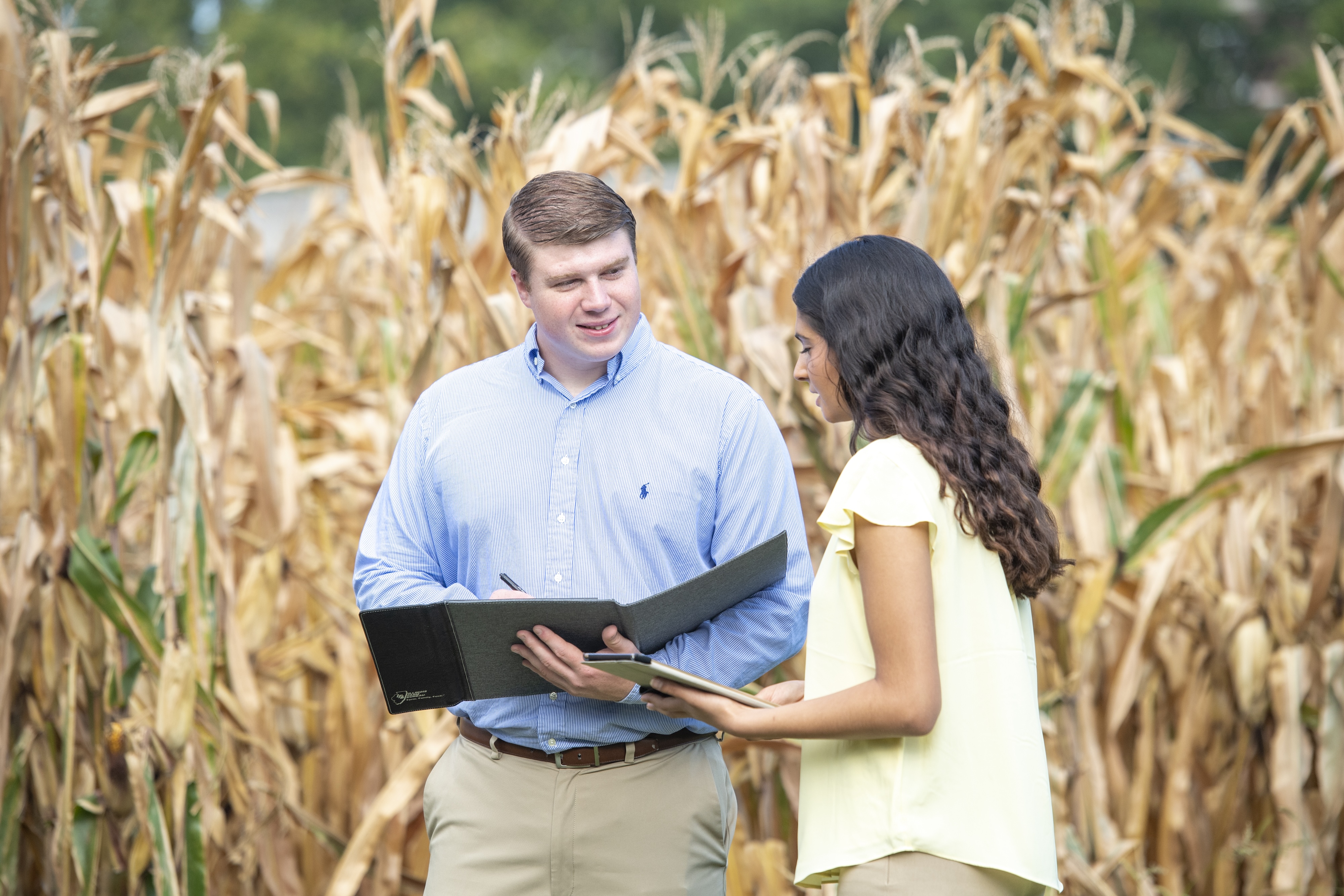
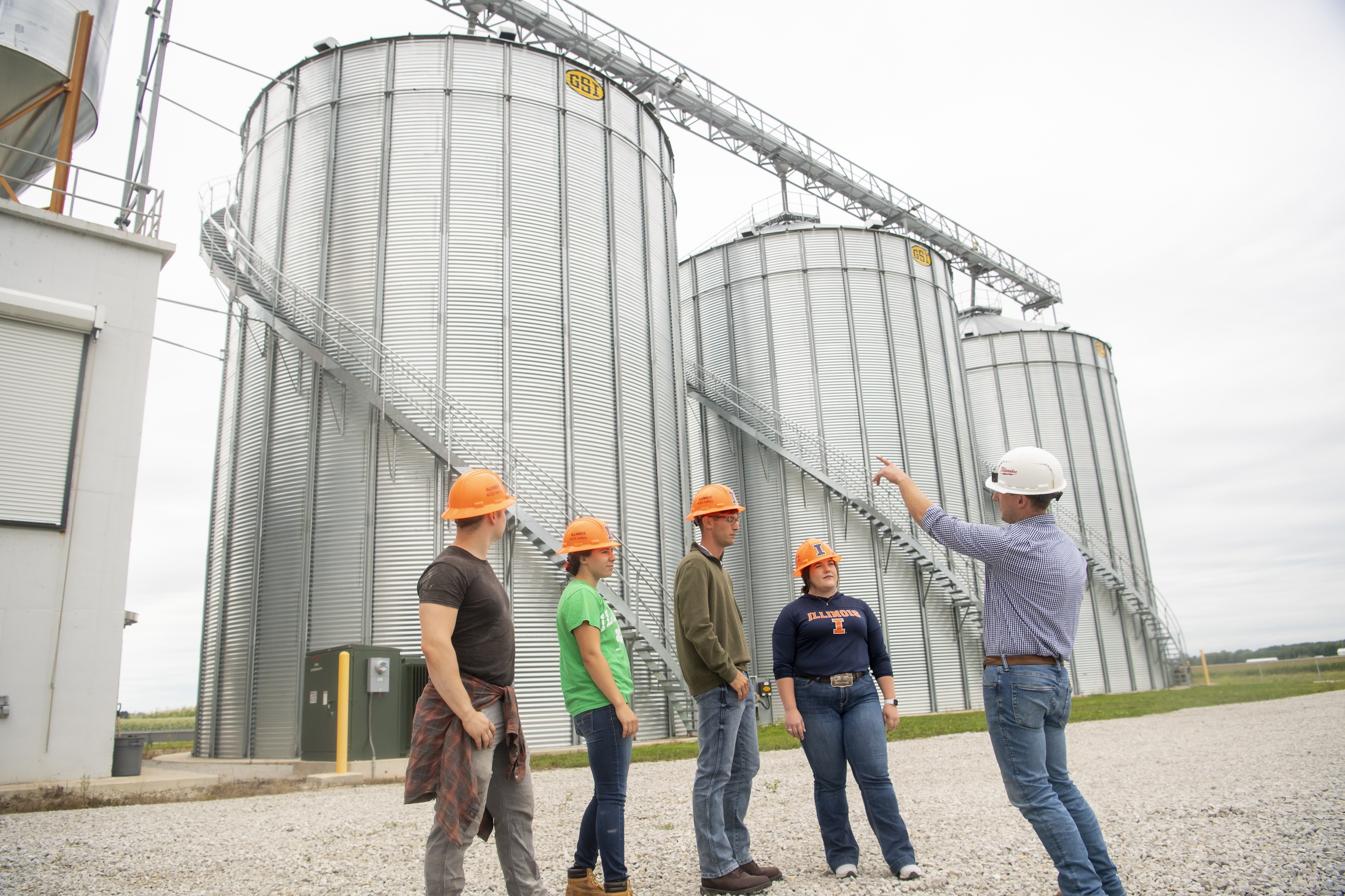
Certificate Description
This online graduate certificate is for early- to mid-career professionals aiming to enhance their expertise in agribusiness management, food production economics, and sustainability.
The program offers comprehensive courses that cover global food production and the distribution of agricultural commodities and food products.
You will dive into financing and risk management in agricultural production and explore various contemporary challenges in the food and agriculture sector.
Skills You Will Learn
Upon completing this certificate, you will:
- Gain a comprehensive understanding of global agricultural supply chains, from initial inputs to consumer markets.
- Assess the factors driving food product demand in diverse economic environments.
- Navigate the complexities of trade policies and their impact on food supply and demand.
- Make strategic, informed decisions in agricultural risk management.
- Analyze agriculture as a viable and dynamic investment class.
- Evaluate the influence of environmental and agricultural policies on sustainability and ESG (Environmental, Social, and Governance) practices.
Course Details
The Agribusiness and Sustainable Food Production Economics Certificate is a 12-credit hour program, consisting of four credit-bearing graduate courses and six Coursera components.
To earn this certificate, you'll complete the following:
- Graduate course: ACE 544 – Global Agriculture and Supply Chains
- Provides essential knowledge of the production and distribution of agricultural commodities and food products. Topics will cover the full range of the agriculture supply chain, from pre-farm to the consumer, to provide students with a better understanding and appreciation for where and how crops and livestock are produced, and the systems used to distribute products to consumer.
- Coursera components:
- Provides essential knowledge of the production and distribution of agricultural commodities and food products. Topics will cover the full range of the agriculture supply chain, from pre-farm to the consumer, to provide students with a better understanding and appreciation for where and how crops and livestock are produced, and the systems used to distribute products to consumer.
- Graduation course: ACE 545 – Risk and Decision-Making in Agriculture
- The food and agriculture sector faces a unique set of risks due to the nature of production and heavy reliance on uncontrollable factors such as weather. This course discusses the risks faced by farmers and food and agribusiness firms, the tools available to manage these risks, and the resulting approaches to managerial decision-making.
- Coursera components:
- The food and agriculture sector faces a unique set of risks due to the nature of production and heavy reliance on uncontrollable factors such as weather. This course discusses the risks faced by farmers and food and agribusiness firms, the tools available to manage these risks, and the resulting approaches to managerial decision-making.
- Graduate course: ACE 546 – Agriculture as an Asset Class
- Modern agriculture relies heavily on capital, assets, and financing. Students will examine scale and structure of the US agricultural sector, capital structure and financing of the asset class, rise of investment activities, and ag-specific institutions which serve the industry. Topics include financial performance, asset exposure mechanisms, and emerging investment opportunities.
- Coursera component:
- Modern agriculture relies heavily on capital, assets, and financing. Students will examine scale and structure of the US agricultural sector, capital structure and financing of the asset class, rise of investment activities, and ag-specific institutions which serve the industry. Topics include financial performance, asset exposure mechanisms, and emerging investment opportunities.
- Graduate course: ACE 547 – Modern Issues in Food & Agriculture
- With a projected global population of 9.7 billion by 2050, students in this course will discuss current food, agriculture, and sustainability challenges through a point/counterpoint framework to voice opinions and ask questions. Students will gain comprehensive knowledge of contemporary, ever-changing issues across the agriculture sector, from production to consumption.
- Coursera component:
- With a projected global population of 9.7 billion by 2050, students in this course will discuss current food, agriculture, and sustainability challenges through a point/counterpoint framework to voice opinions and ask questions. Students will gain comprehensive knowledge of contemporary, ever-changing issues across the agriculture sector, from production to consumption.
Read course descriptions in the ACE Academic Catalog.
How to Enroll
Applying for this certificate
To apply for a graduate certificate program, you'll need to start an online application through the University of Illinois Graduate College.
The following items are required for your application:
- Bachelor’s degree: Unofficial transcripts are acceptable. A grade point average (GPA) of 3.0 (A=4.0), or comparable GPA for an international applicant, for the last two years of undergraduate study is a minimum requirement for admission
- Professional resume: This should include personal information (name, address, telephone number, and email address), academic background, work experience (start and end dates for each position and a brief description of responsibilities), educational training, professional associations, and leadership experiences. Please limit your resume to two pages.
- English proficiency scores (international students only): If you are a non-native English speaker, you must upload your TOEFL or IELTS scores directly to your application. Review the Graduate College’s English proficiency requirements for more details on possible exemptions.
Apply as a certificate student
Applying as a non-degree student
If you're only interested in a specific course or unsure if you want to pursue a certificate right now, you can enroll as a non-degree student.
Being a non-degree student allows you to enroll in a for-credit course, complete it, and apply those graduate credits towards a certificate or degree at a later time.
This route offers flexibility as you choose which courses interest you and customize your education to fit your schedule.
Title
Accelerate Your Career
Invest in yourself with an adaptable, cost-effective education to help you succeed.
At ACES, we design our online programs to meet you where you are and take you to where you want to be.
World-Class Faculty

Gary Schnitkey, Ph.D.
Professor
Dr. Gary D. Schnitkey is a Professor in the Department of Agricultural & Consumer Economics (ACE) and Soybean Industry Chair in Agricultural Strategy at the University of Illinois. Dr. Schnitkey uses Farm Business Farm Management (FBFM) data on revenue and costs to analyze major field crops' profitability and assess the impacts of farm programs and risk management strategies. His research informs farmers of the most profitable rotations and encourages long-term change to impact yield. Along with his numerous journal article publications, Dr. Schnitkey regularly publishes his research findings on farmdocDAILY.
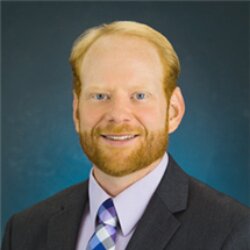
Nick Paulson, Ph.D.
Gardner Hinderliter Professor of Farm Management
Nick Paulson is the Gardner Hinderliter Professor in Farm Management and Associate Head in the Department of Agricultural & Consumer Economics (ACE) at the University of Illinois. Paulson teaches undergraduate courses in small business finance, business planning, and international agribusiness. His research and extension programs focus on finance, risk management, and policy related to commercial agriculture. He earned his MS and PhD in economics from Iowa State University and is originally from southeastern Minnesota, where he grew up on his family’s grain farm.

Bruce Sherrick, Ph.D.
Fruin Professor in Land Economics and Director of TIAA Center for Farmland Research
Dr. Bruce Sherrick is a Department of Agricultural & Consumer Economics (ACE) Professor, Director of the TIAA Center for Farmland Research, and Fruin Professor in Land Economics at the University of Illinois. Dr. Sherrick helps improve crop insurance programs for crop producers across the United States. Through Farmer Mac, he helps create and implement loan-funding programs that increase farmers' access to capital. As a Farmland Technical Advisory Board member, he coordinates the required calculations supporting Illinois's use-value farmland assessment system. Dr. Sherrick helps build information systems for agricultural asset markets that utilize big data and novel computational strategies to understand farmland values better.
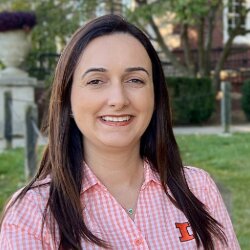
Joana Colussi, Ph.D.
Instructor
Dr. Joana Colussi is an instructor and postdoctoral research associate in the Department of Agricultural & Consumer Economics (ACE) at the University of Illinois Urbana-Champaign. She joined the academic work following a 10-year career as an agricultural journalist in Brazil. Afterward, she graduated with a master's in Agribusiness and a Ph.D. in Management from the Federal University of Rio Grande do Sul. Joana is also a member of the farmdoc team, an Extension group from the University of Illinois.

Ailie Elmore
Instructor
Ailie Elmore is an academic instructor in the Department of Agricultural & Consumer Economics (ACE) at the University of Illinois in Urbana-Champaign. She teaches courses in farm management, investment planning, personal finance, small business finance, and sales. Ailie grew up on a grain farming operation in Montgomery County, Illinois and continues to work alongside her father and brother. She received her Bachelor of Science degree in Agricultural and Consumer Economics and her Master of Science degree in Agricultural and Applied Economics from the Department of ACE, where she specialized in finance. Ailie is passionate about commercial agriculture and its intersection with finance, as well as educating the next generation of professionals in this space.
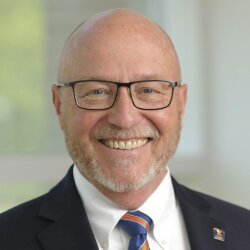
Paul B. Stoddard
Senior Lecturer
Paul Stoddard challenges students to think about new things in different ways and old things in new ways to open up new areas of study and exploration in agricultural economics. Every day, he strives to reduce knowledge to “that simple compound of the obvious and the wonderful,” as H. L. Mencken put it, to help students become passionate ambassadors for agriculture, for the business of food, and for the department and college.
Ready to start the certificate?
FAQ
Who should pursue this certificate?
The Agribusiness and Sustainable Food Production Economics Certificate develops skill sets for those in:
- Agriculture supply chain industries
- Agribusiness management
- Food supply chain analysis
- Data science, marketing, or sales for a food products or agriculture company
- Agricultural economics and policy analysis
- Environmental and sustainability advisory roles
- Agribusiness marketing and sales associates
- Agricultural investment management
- And more!
What is the ACES Online Learning Experience like?
ACES Online offers a clear path for graduate-level learners. Move from Coursera (open learning components) to For-Credit Graduate Courses (credit-bearing) to Certificate Completion.
Coursera (non-credit open learning components)
The College of ACES develops Coursera open learning components that are open to anyone and are available on Coursera. These courses serve as the foundational content for our graduate certificate programs.
While completion of the Coursera components is required to complete the for-credit graduate courses, please note that Coursera completion alone is not credit-bearing.
You can begin your learning journey at your own pace at any time by starting with one or more Coursera components. These low-cost entry points allow you to gain foundational knowledge necessary for the certificate courses. If you're not ready to commit to a full graduate certificate, these courses provide a flexible, accessible, and affordable entry point.
For-Credit Graduate Courses
You can complete Coursera components either before or concurrently with graduate course enrollment. The graduate courses build on the foundational content from the Coursera components and include high-engagement features such as:
- Weekly Live Sessions: Participate in real-time interactions with instructors and peers. Recordings are available for those who cannot attend live.
- Assessments: Regular assessments help reinforce learning and track your progress.
- Group Projects: Collaborate with fellow students on practical projects.
- Office Hours: Weekly office hours offer direct access to instructors for additional support and clarification.
The for-credit graduate courses are hosted on Canvas, providing an interactive and supportive learning environment.
Certificate Completion
You earn a graduate certificate by completing the graduate credit courses. This certificate signifies mastery of the subject matter and can be a significant step towards further academic or professional goals.
Each certificate page will list and link the relevant Coursera courses required for that certificate, ensuring you have direct access to the necessary Coursera components.
This structured approach allows you to start with non-credit Coursera components, build on that knowledge with for-credit courses on Canvas, and ultimately earn your graduate certificate.
What is a Coursera Component?
- Open learning, affordable, flexible, and accessible online course
- Self-directed and self-paced
- Non-credit
- On-demand, start anytime
- Provides foundational knowledge for a corresponding for-credit graduate course
What is a for-credit Graduate Course?
- For-credit graduate courses count towards your pursuit of a graduate certificate
- Enroll as a non-degree student to explore a variety of degree programs
- Start at various times in Spring, Summer, or Fall
What is a Graduate Certificate?
- 12-credit hours, comprised of 3 to 4 graduate courses
- Designed around specific skills and competencies
- Earn a transferable certificate that can be stacked toward a master’s degree
What is an Online Master's Degree?
- 32 to 36 credit hours
- Flexible and adaptable to fit your schedule
- 100% Online
- Features the same rigor and faculty you would have in the on-campus program
- Applications are accepted throughout the year
- Begin in the Spring, Summer, or Fall
Is this certificate applicable to other University of Illinois programs?
Students who have completed this certificate may use the certificate courses to satisfy the following degree requirements, provided they apply and are admitted to the degree program:
-
12 hours as an approved Graduate Certificate or elective coursework for the Business Administration, MBA - Online (iMBA) degree program
-
12 hours as an approved Graduate Certificate or elective coursework for the JP: Business Administration, MBA (iMBA) and Accountancy, MS (iMSA) degree program
-
12 hours of Graduate General Electives coursework for the Management, MS degree program
-
12 hours of elective coursework for the Accountancy, MS degree program
-
12 hours of Field Specialization coursework requirements for the Agricultural and Applied Economics, MAAE degree program
Have more questions?
Email us at acesonline@illinois.edu or call 217-265-4194
Looking for something different?
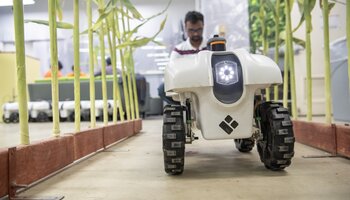
Digital Agriculture Professional Certificates
This fully online, interdisciplinary program includes classes in the Agricultural and Biological Engineering, Computer Science, and Crop Sciences departments at the University of Illinois Urbana-Champaign.
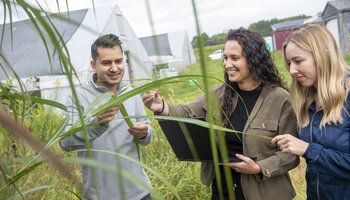
Land, Agriculture and Alternative Investing - Graduate Certificate
Become well-versed in ag-related financial markets and alternative investment strategies with just two semesters of online coursework.
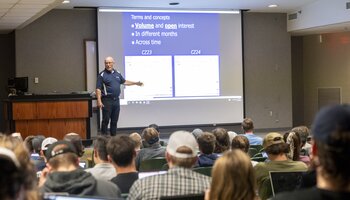
Non-Thesis Master of Agricultural and Applied Economics (MAAE) - Graduate Degree
The non-thesis Master of Agricultural and Applied Economics (MAAE) is a professionally oriented degree designed to prepare graduates for a wide variety of careers in the private sector, including as economic consultants, commodity traders, analysts, or in the public sector with government agencies and international organizations.